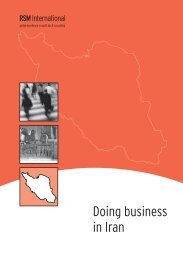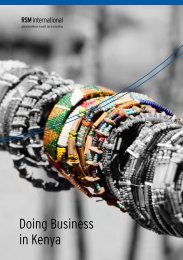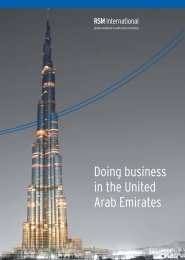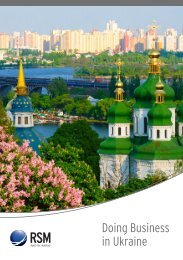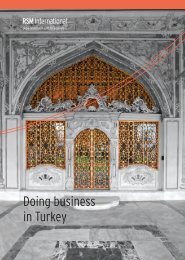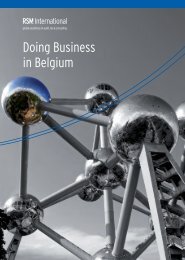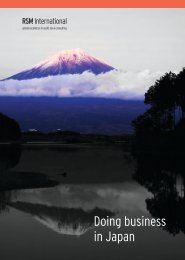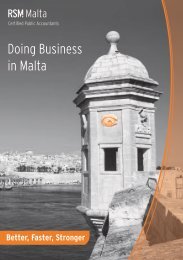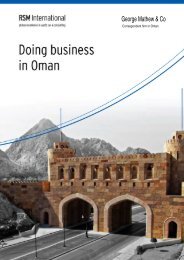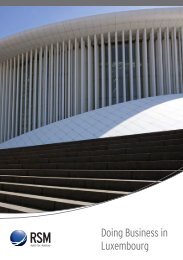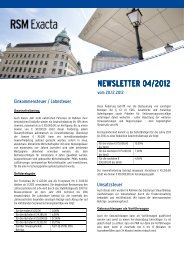Doing Business in India - RSM Austria
Doing Business in India - RSM Austria
Doing Business in India - RSM Austria
Create successful ePaper yourself
Turn your PDF publications into a flip-book with our unique Google optimized e-Paper software.
on goods manufactured and vice versa. Further, education cess (<strong>in</strong>clud<strong>in</strong>g<br />
secondary and higher education cess) paid on <strong>in</strong>put services is available as credit<br />
for payment of education cess (<strong>in</strong>clud<strong>in</strong>g secondary and higher education cess) on<br />
output services.<br />
Credit <strong>in</strong> respect of capital goods is allowed at the rate of 50% <strong>in</strong> the f<strong>in</strong>ancial year<br />
of receipt of capital goods <strong>in</strong> premises of output service provider and 50% <strong>in</strong> the<br />
subsequent f<strong>in</strong>ancial year. Credit is not allowed on <strong>in</strong>put services used <strong>in</strong> provid<strong>in</strong>g<br />
exempted services.<br />
9.4.5 Rebate/Refund for <strong>in</strong>put services and <strong>in</strong>puts used <strong>in</strong> provid<strong>in</strong>g taxable services<br />
The Export of Services Rules, 2005 provides for rebate of service tax paid on<br />
taxable service or service tax or duty paid on <strong>in</strong>put services or <strong>in</strong>puts, as the case<br />
may be, used <strong>in</strong> provid<strong>in</strong>g taxable service, subject to specified conditions or<br />
limitations.<br />
Further, the Cenvat Credit Rules 2004, also provide for claim<strong>in</strong>g refund of unutilized<br />
Cenvat Credit used for provid<strong>in</strong>g output services, which are exported as per the<br />
Export of Services Rules, 2005.<br />
9.4.6 Threshold Limits<br />
Small service providers whose aggregate value of taxable services provided dur<strong>in</strong>g<br />
the preced<strong>in</strong>g f<strong>in</strong>ancial year does not exceed Rs. 10,00,000 have been given an<br />
option to claim exemption from service tax up to an aggregate value of taxable<br />
services of Rs. 10,00,000 <strong>in</strong> a f<strong>in</strong>ancial year, subject to certa<strong>in</strong> conditions as<br />
prescribed. Benefit of this exemption scheme is not available wherever service tax<br />
is payable by a person other than the service provider or the taxable services are<br />
provided by a person under a brand name or trade name, whether registered or not,<br />
of another person. Threshold limit for obta<strong>in</strong><strong>in</strong>g service tax registration is<br />
Rs. 9,00,000.<br />
10.0 DIRECT TAX CODE ('DTC')<br />
The F<strong>in</strong>ance M<strong>in</strong>ister of <strong>India</strong> presented the Direct Taxes Code Bill 2010, <strong>in</strong> Lok Sabha<br />
on 30 August 2010. The purpose of <strong>in</strong>troduc<strong>in</strong>g DTC Bill, which is proposed to be<br />
effective from 1 April 2012, is to completely overhaul the exist<strong>in</strong>g complexities of the<br />
Income Tax Act, 1961. DTC would eventually replace the present Income-tax Act,<br />
1961 (“IT Act”) and the Wealth-tax Act, 1957 (“WT Act”) and would consolidate both<br />
the Acts. The present IT Act, is about 50 years old and it was high time to replace it <strong>in</strong><br />
view of <strong>in</strong>numerable amendments to it over a period of time. The primary thrust of<br />
DTC is on certa<strong>in</strong>ty and cont<strong>in</strong>uity and DTC <strong>in</strong> its present structure has chosen the<br />
path of stable reforms rather than <strong>in</strong>dulg<strong>in</strong>g <strong>in</strong> path break<strong>in</strong>g radical reforms.<br />
Initially, the Draft DTC along with the Discussion Paper was released by M<strong>in</strong>istry of<br />
F<strong>in</strong>ance on 12 August, 2009 for public comments. In response to the same, a number<br />
of valuable <strong>in</strong>puts on the proposals outl<strong>in</strong>ed <strong>in</strong> the draft DTC were received from a<br />
large number of various organizations and <strong>in</strong>dividuals. The M<strong>in</strong>istry of F<strong>in</strong>ance<br />
130<br />
DOING BUSINESS IN INDIA



